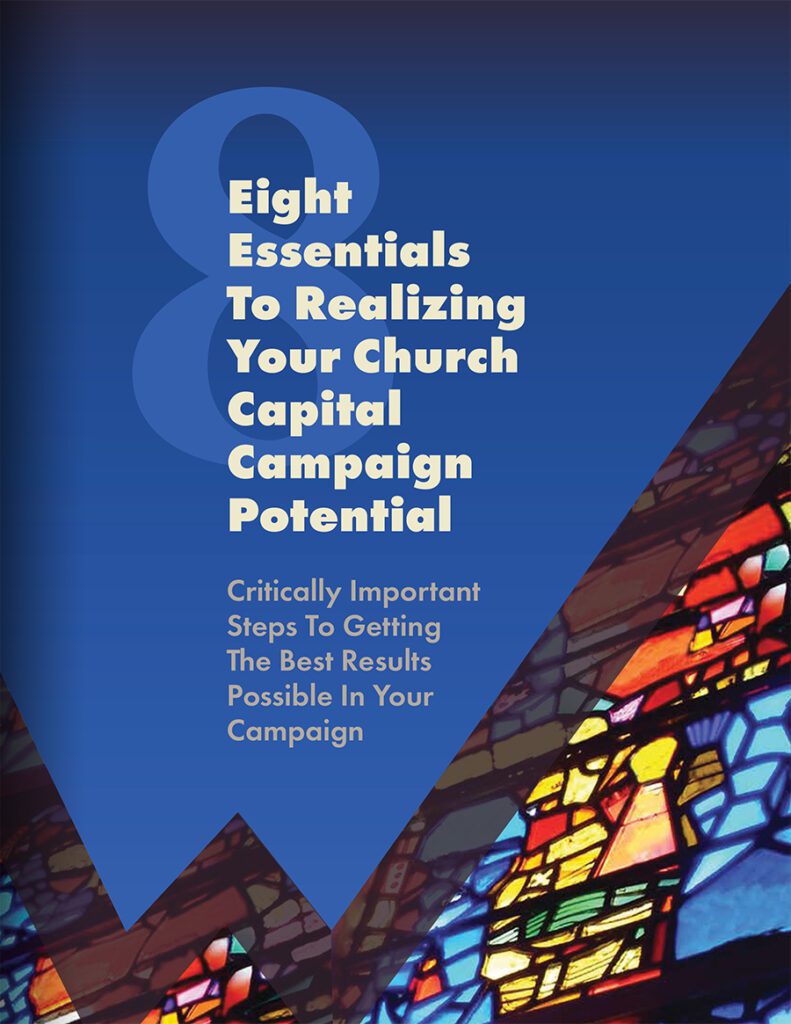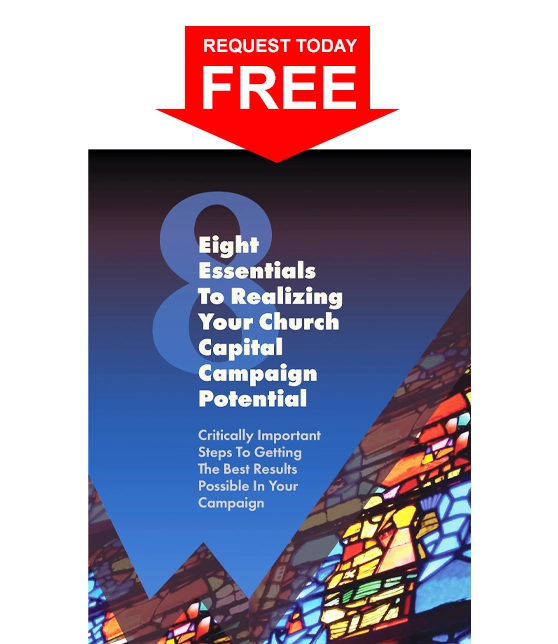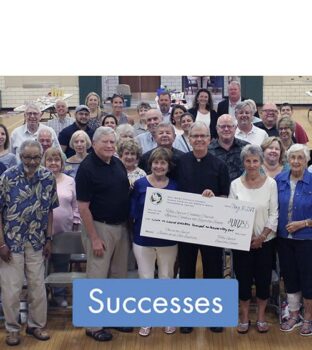
We’re pleased to provide you with free, helpful and timely information and advice to help you better prepare for and optimize the success of your capital campaign. Please, contact us at 800-894-3863 or info@walshfundraising.com to request, or register to receive, any of our free resources below.
Capital Campaign Resources
Best practices you need to know before you begin your campaign.
Request Your Free Success Booklet
Call us today at 800-894-3863 and click to receive our free church capital campaign success booklet.
Then, once we’ve talked about your needs and your campaign’s projected timing, we have additional resources we can send you. These include our church capital campaign planning sheet, a special report, short tip sheets and videos that will walk you through the best and simplest approach to searching for, screening and selecting a capital campaign consulting firm that will serve your church the best.
Our Blog – Walsh Wisdom
Looking for expert insights on church capital campaigns, stewardship, and year-end giving? Visit Walsh Wisdom, our blog packed with practical advice, case studies, and strategies to help your parish plan, fund, and execute successful campaigns. Click through to explore articles that will inspire, guide, and equip your church for effective fundraising and lasting impact.
Frequently Asked Questions
Learned more about preparing for your capital campaign.
What is a capital campaign?
How much time does it take to conduct a campaign?
Allow at least 2 months for conducting a fundraising feasibility study prior to the start of your campaign (if you elect to do one). Allow at least 6 months for the actual campaign in order to maximize results.
Should we hire a consultant to help us with our campaign?
Studies have shown that hiring a consultant will result in raising at least one-half times your church gift income more than doing a campaign on your own.
Plus, you’ll save hundreds of hours of time that someone from the church would otherwise have to spend organizing and operating the campaign yourselves.
So unless the consultant’s fee and other expenses associated with their work will exceed the cost of your time and the income you’ll lose by not hiring a consultant, hiring counsel is a smart and worthwhile investment – if you hire the right consultant.
What level of service should we look for and expect?
It depends on what you are wanting to raise and how well you want to do in your campaign.
If you are looking to raise less than 1 times your annual giving for a project that primarily involves debt reduction, less than 1.5 times your annual giving for a project that primarily involves plant maintenance, or less than 2 times your annual giving for a project that primarily involves new building or renovation, you can probably get by with more of a “consultative approach” with minimal (10 to 15 days) of on-site support from a consultant. This is especially true if you’re okay with doing more of the work yourselves and raising at least 1 times your annual giving less than you could otherwise expect from a more hands on approach.
If are looking to raise more than this however, and minimize the work of volunteers and church staff, you should hire someone who will agree to come to the church at least every other week for 2 to 4 days for a total of 30 to 40 days over a 6 month period minimally to allow adequate time for the completion of key tasks and the cultivation and procurement of all but especially key gifts.
In short, you need someone who will not only direct but will drive your campaign – someone who agree to coordinate and attend all meetings and major events and personally handle consultant critical tasks such as the development of various organization and orientation materials, printed, promotional and proposal materials, and the training of all campaign leaders and volunteers. Of course, you could have someone come to the church for more time than this – even weekly if you wish – but this has not proven to enhance results. In fact, it only adds to the campaign’s expense. And while some think a good solution to this is to shorten the timeframe for the campaign, this results in compressing the time people have to do their jobs and, as a result, it more often than not, actually costs even more because you’ll raise at least one-half times your church’s annual giving less in your campaign with a shorter time frame.
Our suggestion, however, is that whenever you have the chance to do a capital campaign – seek to do your best. Try to get the best results and best return on investment that you possibly can. You can always find other things you need and can fund, maybe a reserve fund or endowment for church maintenance and emergencies, which very few churches have.
How much can we realistically expect to raise?
You can realistically expect to minimally raise at least 1.5 times your annual giving for a project that primarily involves debt reduction, at least 2 times annual giving for a project that primarily involves plant maintenance, and at least 2.5 times giving for a project that primarily involves new building or renovation with a professionally and correctly driven campaign. And you can do even better (or worse) than this depending on the timeline for the campaign, the level of service you get (see #3 & 4 above) and how you ask for gifts.
What does a capital campaign cost?
How many volunteers are needed for a successful campaign?
There will be more and broader ownership for the project and campaign which will translate into more and better gifts from both your volunteers and the people they will ultimately invite to participate and give.
Plus, with more volunteers, you’ll build and strengthen relationships within your church. This will create a greater sense of unity and community that will continue to benefit you well beyond the campaign.
How much time will be required of our pastor and church staff?
The pastor is usually asked to help by recruiting key leadership, assist in the solicitation of some key gifts and to speak at various campaign meetings and events.
Church staff is asked to do far less because most professional directed campaigns have their own campaign director and secretary who handle most of the details associated with the campaign.
How long does a capital campaign take?
A well-done campaign will take approximately 6 months to complete – 2 months for campaign preparation and 4 months for campaign implementation. That is exclusive of the time it takes for a feasibility study if you plan or would like one done. This length of time allows adequate time for the recruitment of volunteers and the solicitation of key major gifts, as well as everyone else’s gifts. It’s also not so long that it causes people to lose enthusiasm for the effort or for the campaign, itself, to lose momentum.
If you plan on doing a fundraising feasibility study in advance of your campaign, add 2 months to this schedule. And if you plan to hire professional counsel to assist you, which you should do, add an additional 2 months to allow enough time for the search and selection process.
When is the best time of year to conduct a capital campaign?
When do we need to start a campaign to complete it by a certain time?
Is now a good time to do a campaign?
The best thing you can do is take some steps toward addressing them today. Keep in mind too, that campaigns typically extend over three or more years during which the challenges of today tend to change. So, even if some people can’t participate, or participate to the extent that they otherwise might or would like, that’s not to say they won’t be able to participate in a few months or years’ time.
It’s also important to note that in slower economic times, interest rates and building costs tend to be more reasonable. So, if you’re considering any type of construction project, these lower costs make it a good time to proceed.
Do you recommend doing a fundraising feasibility study?
For example, if you are looking to raise funds primarily for plant maintenance projects or to reduce or retire debt and need to only raise one to one-and-a-half times your annual church giving, you wouldn’t necessarily need a feasibility study to assure your campaign’s success because it’s a very realistic sum to expect. The same would hold true for a building or renovation project where a church is looking to raise up to two to two and half times its income or less. This should be relatively simple relative to the church’s income.
That being said, a feasibility study is always helpful and always will help you to raise more than you otherwise might without one. That’s because a well-done study will help identify people’s key questions and concerns. It’ll help to identify who the key leaders and donors could and should be and what might motivate people to get involved and to give more. In short, it’s may not always be necessary, but it’s a smart first step that will pay for itself many times over if you put the information gathered to good use.
How long does a feasibility study take and what does it cost?
How will a campaign affect regular giving to the church?
As a result, regular giving should be enhanced. This can also be assured if you ask people annually to consider increasing their regular gifts to the church. And the campaign’s effect on regular giving can be particularly positive when the pledge fulfillment period ends because many will redirect what they are in the habit of giving to the campaign, if asked, to their regular giving instead.
Can we combine our capital and annual stewardship efforts?
How do we go about searching for and selecting a consultant?
So is asking other churches that have recently done successful campaigns “who” they used. Select up to two (or three at the most) consulting firms who work solely with churches, and ideally only do church capital campaigns. Then request background information on the firm, their typical or suggested approach to church capital campaigns, the services they provide, the costs involved and a list of clients and/or references.
Review these materials and select no more than two (or at the very most 3) to interview. Choose firms who organize and operate their campaigns in the most proven to be productive and successively successful ways.
In short, they should provide at least 30, and ideally no more than 40 days of on-site service to you during your campaign, they should allow at least 6 months to complete the campaign, and they should advocate asking for gifts in the most personal and proven to be productive ways where people are asked to prayerfully consider specific, challenging gifts in-person first, in a group setting second, by phone third, and by email and mail last, without ever skipping a step or preceding with a less productive approach before exhausting a more personal and productive approach. Contact these chosen few firms to see when they are available for interviews.
Then, bring these dates back to your selection committee if you have one (and you should) and pick one or two consecutive days for interviews. Interview no more than two people a day so no one is in the often forgotten middle position. Allow at least an hour and fifteen minutes for each interview and an hour and a half between interviews.
This allows adequate time for firms to present their proposed services to you and enough time between interviews to keep your selection committee fresh. And then make your selection within 48 hours of the final interviews while the information presented is fresh.
Should we ask and expect to meet the consultant?
This is important for several reasons.
First, you want to meet the person who will supervise and provide back up support to the consultant you ultimately work with.
Second, you want to buy into the “process” before the “people” the firm employs.
Third, you want the project supervisor to pick from the pool of available consultants someone who would be the best fit for you. This is best done by having the supervisor personally meet and get to know you.
Keep in mind that the firms that get the best results are ones whose consultants aren’t always readily available. Instead, they are both in demand – which is good – and already involved in a very hands-on way in serving other churches.





